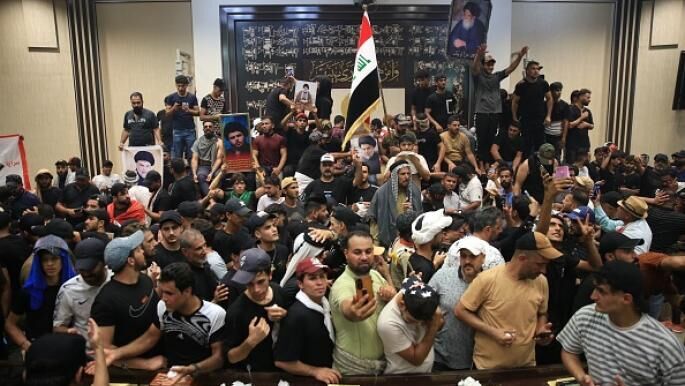Political geography and return of Baathism in that country, adding: The current differences and conflicts between Shiites are the best situation for the abuse of the Zionist regime.
In an interview with the website of the Strategic Council on Foreign Relations, Amir Mousavi referred to the political developments in Iraq and the recent unrest in that country and said: Regional and international activists, especially the Zionist regime and some reactionary Arab governments of the Persian Gulf, do not see their interests in the existence of a strong and powerful Iraq and they evaluate it as a risk for themselves; because the political orientation of that country is not aligned with them and the weakened Iraq provides their interests more.
Stating that Saddam’s actions were in line with arrogant policies, and for this reason, those players provided various assistance to Iraq during that period, he said: Since the fall of Saddam in 2003 so far, we have repeatedly witnessed foreign interventions and challenges in Iraq.
The expert on West Asia affairs called the formation of Hashd al-Shaabi in Iraq as a cause of concern among supporters of the US and the Zionist regime policies in the region and continued: Enemies of the resistance and some foreign players want the existence of a weak government in Iraq and intensification of divisions in that country and the differences and the current conflicts between Shiites are the best opportunity for the abuse of the Zionist regime.
Mousavi considered Iraqi Shiites to be the main movement that is suffering due to the current political conditions in that country.
Saying that the political system which is based on partisanship and sectarianism in Iraq has dealt a big blow on the people of that country and we are repeatedly witnessing illegal blackmails that affect the national interests, he pointed out: The current situation in Iraq has become as such that all the opponents of the resistance front, including the Baathists, the ISIS, and the communists, have gathered under the umbrella of the Sadr movement and are fighting with the resistance front in Iraq, as such that very bad conditions have been created in the Shiite areas by the enemies of the resistance. They wanted to change the situation in Iraq through ISIS, but they failed and now they have turned to a soft war with the resistance.
The expert on West Asia affairs pointed to the economic benefits that the Zionist regime and some Arab countries of the Persian Gulf gain by weakening Iraq and explained: The UAE and Kuwait certainly do not want Iraqi ports to prosper and replace their ports; as we have seen, how they destroyed Umm Qasr and Al Faw ports, therefore, they do not allow any project by the central government to be implemented there. We have always witnessed the efforts of Saudi Arabia to change the political situation in Iraq.
Mousavi reminded: Turkey has built 16 dams on Tigris and Euphrates and has greatly reduced the water volume of those two rivers, but Iraq is unable to solve this problem. Turkey has established 36 military bases in northern Iraq near Mosul, frequently bombards those areas, and so far a large number of civilians have been killed in that country. In addition, Turkey has territorial claims to Mosul and Kirkuk, which is a large source of oil and has good agricultural land.
Emphasizing that the Shiites in Iraq also made mistakes and that is why the opposite front has gained strength, he added: The enemies of the resistance are trying to make the best of this situation and we are now witnessing a heavy propaganda, media and cultural attack with all kinds of accusations against the resistance in Iraq.
The analyst of West Asia affairs said: Foreign players and enemies of Iraq want division and disintegration, change of political geography and the return of the Baathist movement in that country, just as they are now trying hard for the return of the military and security commanders of that movement. They want to destroy Hashd al-Shaabi and resistance groups in a long-term plan with all kinds of accusations, divisions and differences.
Mousavi continued: Although the United States reduced its military presence in Iraq, it will definitely not abandon its interests in that country. From the US point of view, Iraq is a point that can become a platform for Shiite resistance in the world, and due to the geographical location and energy resources available in that country, foreign players attach an important role to it, but unfortunately, it seems that the people and Shiites of Iraq do not understand the risks that foreign players threaten their country’s interests and resources.
He emphasized: The intensification of foreign interventions and the war for power in Iraq, especially between Shiite groups, threatens the stability and security of society and the national security of that country in general. Certainly, in those conflicts, no group will win the field and all will suffer. Today, Iraq is in a very sensitive situation and the continuation of mistakes can cause irreparable damages such as the displacement of millions of Iraqis, economic collapse and changes in the political geography, and face those people who are still dealing with the consequences of ISIS terrorism with greater suffering.
The Complexities and the Necessity of Confronting ISIS-Khorasan
Strategic Council Online – Note: With the rise of the Taliban in Afghanistan, the issue of ISIS-Khorasan, the conflict between these two groups, and the expansion of the scope of their security threats in the region have become more critical than ever before, as the terrorist activities of this terrorist group disrupt regional security. In addition to this, support for suicide activities and armed individuals in the region has also put the security of Iran at risk. Therefore, ISIS-Khorasan is recognized as a significant threat to the eastern security of our country.
Dr. Hossein Ebrahimnia – Regional Issues Expert










0 Comments